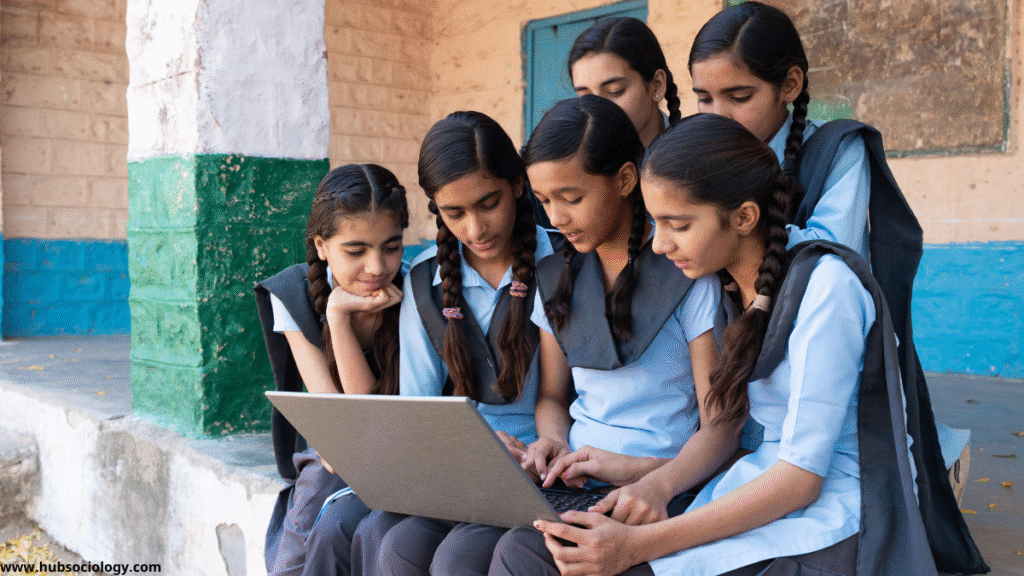Introduction
In the digital age, cybersecurity has become a critical aspect of governance, economy, and social interactions. India, with its rapidly growing internet penetration and digital transformation, faces unique challenges in balancing technological advancement with security and privacy concerns. Cybersecurity laws are not just legal frameworks but also reflect societal values, power structures, and cultural norms. This article examines cybersecurity laws in India from a sociological perspective, analyzing their impact on social behavior, privacy, governance, and digital inequalities.

Cybersecurity Laws in India: An Overview
India’s cybersecurity legal framework is primarily governed by the Information Technology Act, 2000 (IT Act) and its amendments, along with other regulations such as the National Cyber Security Policy (2013) and Additionally, the Digital Personal Data Protection Act of 2023 took the role of the Personal Data Protection Bill of 2019, which was eventually withdrawn. These laws aim to:
- Prevent cybercrimes (hacking, phishing, identity theft).
- Protect data privacy and regulate corporate data handling.
- Ensure national security by monitoring cyber threats.
However, the implementation and societal implications of these laws reveal deeper sociological dynamics.
Sociological Implications of Cybersecurity Laws
1. Digital Surveillance and Privacy Concerns
One of the most debated aspects of cybersecurity laws is state surveillance. The government can intercept, monitor, or decode digital information for national security purposes thanks to provisions like Section 69 of the IT Act. While necessary for countering terrorism and cyber threats, such measures raise concerns about privacy erosion and civil liberties.
- Social Trust and Government Monitoring: Increased surveillance can lead to public distrust, especially among marginalized communities who may fear disproportionate targeting.
- Chilling Effect on Free Speech: Fear of surveillance may discourage citizens, activists, and journalists from expressing dissent, impacting democratic discourse.
2. Cybercrime and Social Behavior
Cybercrimes with sociological roots include revenge porn, cyberbullying, and online fraud. The IT Act criminalizes these acts, but enforcement remains inconsistent.
- Gender and Cybercrime: Women and LGBTQ+ individuals face higher risks of cyber harassment. Laws like Section 66E (privacy violation) and Section 67A (punishment for sexually explicit content) are steps forward, but societal attitudes often discourage reporting.
- Youth and Cyber Ethics: With increasing internet use among youth, cybersecurity education is crucial. Societal norms influence online behavior—lack of awareness leads to higher vulnerability.
3. Digital Divide and Access to Justice
India’s socioeconomic disparities affect cybersecurity enforcement.
- Urban vs. Rural Divide: Rural populations with limited digital literacy are more susceptible to scams but have less access to legal recourse.
- Class and Cybersecurity: Wealthier individuals and corporations can afford better cybersecurity measures, while the poor remain vulnerable to data breaches and financial fraud.

4. Corporate Data Handling and Societal Trust
The Digital Personal Data Protection Act (2023) mandates how companies handle user data. However, frequent data breaches (e.g., Aadhaar leaks) have eroded public trust.
- Capitalism and Data Exploitation: Big tech companies often prioritize profit over privacy, leading to ethical dilemmas.
- Consumer Awareness: Many Indians unknowingly consent to invasive data collection due to lack of awareness, raising questions about informed consent in a digitally unequal society.
5. Cybersecurity and Nationalism
Cybersecurity laws are increasingly tied to nationalism and digital sovereignty.
- Data Localization Debates: Laws requiring Indian user data to be stored within the country are framed as protecting national security but also reflect geopolitical tensions (e.g., bans on Chinese apps).
- Cyber Warfare and Social Panic: Fear of foreign cyberattacks (e.g., from China or Pakistan) influences public opinion and policy, sometimes leading to xenophobic reactions online.
Case Studies: Societal Impact of Cybersecurity Laws
1. Aadhaar Data Breaches and Privacy Rights
India’s biometric identification system, Aadhaar, has experienced numerous data breaches. While the government emphasizes its benefits, critics argue that weak cybersecurity undermines trust in state institutions.
2. Internet Shutdowns and Civil Liberties
India frequently imposes internet blackouts (e.g., in Kashmir) citing security reasons. Such measures disrupt daily life, education, and business, disproportionately affecting marginalized groups.
3. Social Media Regulation and Free Speech
Laws like IT Rules, 2021 mandate social media companies to remove content deemed harmful. While curbing misinformation is essential, arbitrary censorship risks suppressing legitimate dissent.
Conclusion: Toward a Socially Just Cybersecurity Framework
Cybersecurity laws in India must balance security, privacy, and social equity. A sociological approach suggests:
- Strengthening Digital Literacy: Educating citizens on cyber rights and safety.
- Inclusive Policymaking: Ensuring laws protect marginalized groups without enabling surveillance overreach.
- Corporate Accountability: Enforcing stricter penalties for data misuse by corporations.
- Transparent Governance: Building public trust through clear, democratic cyber laws.
As India advances digitally, cybersecurity must evolve as a societal safeguard, not just a legal obligation. The interplay between law, technology, and society will determine whether cybersecurity empowers or controls citizens in the years to come.

Do you like this this Article ? You Can follow as on :-
Facebook – https://www.facebook.com/hubsociology
Whatsapp Channel – https://whatsapp.com/channel/0029Vb6D8vGKWEKpJpu5QP0O
Gmail – hubsociology@gmail.com
Topic Related Questions
5-Mark Questions (Short Answer)
- Define cybersecurity laws and explain their significance in modern Indian society.
- How does Section 69 of the IT Act, 2000 impact individual privacy in India?
- What are the key provisions of the Digital Personal Data Protection Act (2023)?
- Explain the relationship between cyberbullying and gender-based violence in India.
- How does the digital divide affect cybersecurity awareness in rural India?
- What is the role of the National Cyber Security Policy (2013) in safeguarding India’s digital infrastructure?
- How do internet shutdowns in India impact social and economic life?
- Briefly discuss the ethical concerns related to corporate data handling in India.
- What are the sociological implications of Aadhaar data breaches?
- How does social media regulation in India affect freedom of expression?
10-Mark Questions (Detailed Answer)
- Discuss the impact of cybersecurity laws on privacy and civil liberties in India, with reference to state surveillance.
- Analyze the role of cybersecurity laws in combating cybercrimes against women in India.
- Examine the challenges in implementing cybersecurity laws in rural versus urban India.
- How do cybersecurity laws reflect power dynamics between the state, corporations, and citizens?
- Critically evaluate the effectiveness of the IT Act, 2000, in addressing modern cyber threats.
- Discuss the link between digital literacy and cybersecurity awareness in Indian society.
- How does data localization under Indian cybersecurity laws impact global tech companies and user privacy?
- Explain the sociological consequences of frequent internet shutdowns in conflict zones like Kashmir.
- What are the ethical dilemmas in balancing national security and individual privacy under cybersecurity laws?
- How do cybersecurity laws in India address the issue of fake news and misinformation?
15-Mark Questions (Essay-Type/Long Answer)
- “Cybersecurity laws in India are as much about social control as they are about protection.” Critically analyze this statement from a sociological perspective.
- Examine the role of cyber-security laws in shaping digital inequalities in Indian society. How can these laws be made more inclusive?
- Discuss the impact of cyber-security regulations on freedom of speech and dissent in India, with relevant case studies.
- How do India’s cyber-security laws compare with global standards (e.g., EU’s GDPR)? What lessons can India learn?
- Analyze the intersection of caste, class, and gender in cybercrime victimization and legal redressal in India.
- “The Digital Personal Data Protection Act (2023) prioritizes corporate interests over citizen rights.” Do you agree? Justify your answer.
- Evaluate the effectiveness of India’s cyber-security laws in preventing financial fraud and protecting vulnerable populations.
- How does the rise of digital nationalism influence India’s cyber-security policies? Discuss with examples.
- What are the challenges in enforcing cyber-security laws in India? Suggest reforms for better implementation.
- From a sociological perspective, discuss whether India’s cyber-security framework empowers citizens or strengthens state control.
